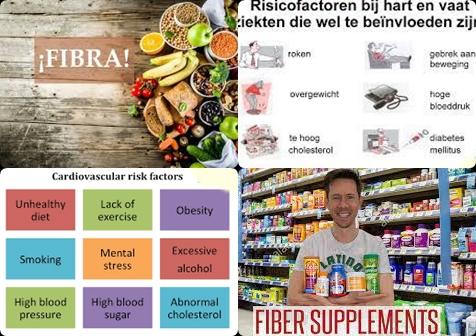
Objectives:
Although several meta-analyses have revealed the beneficial effects of dietary fiber intake on human health, some have reported inconsistent findings. Therefore, this umbrella meta-analysis (review article) has been conducted.
Does higher dietary fiber intake improve causally cardiovascular risk factors?
Study design:
This umbrella review article included 52 meta-analyses of RCTs with a total of 47,197 subjects.
Of the 52 meta-analyses, 35 used high-quality studies, 9 used studies with moderate quality, 7 did not report the quality of the included studies and 1 used low-quality studies.
The dosages and durations of dietary fiber intervention ranged from 3 g/day to 30 g/day (except for one study, which used guar gum at 15 mg/day and another study that used brown rice at 225 g/d) and 4 to 13 weeks, respectively.
Results and conclusions:
The investigators found, overall, higher dietary fiber intake significantly reduced:
-fasting plasma glucose [ES = -0.55, 95% CI = -0.73 to -0.38, p 0.001];
-fasting plasma insulin [ES = -1.22, 95% CI = -1.63 to -0.82, p 0.001];
-homeostasis model assessment of insulin resistance (HOMA-IR) [ES = -0.43, 95% CI = -0.60 to -0.27, p 0.001];
-glycosylated hemoglobin (HbA1c) [ES = -0.38, 95% CI = -0.50 to -0.26, p 0.001];
-serum level of total cholesterol [ES = -0.28, 95% CI = -0.39 to -0.16, p 0.001];
-low-density lipoprotein cholesterol (bad cholesterol) [ES = -0.25, 95% CI = -0.34 to -0.16, p 0.001];
-tumor necrosis factor-alpha serum levels [ES = -0.78, 95% CI = -1.39 to -0.16, p = 0.013];
-systolic blood pressure [ES = -1.72, 95% CI= -2.13 to -1.30, p 0.001];
-diastolic blood pressure [ES = -0.67, 95% CI = -0.96 to -0.37, p 0.001].
Significant means that there is an association with a 95% confidence.
The investigators found sensitivity analysis showed that the overall ESs did not change by excluding any individual meta-analysis.
The investigators found subgroup analysis revealed that the study population and type of dietary fiber could be partial sources of heterogeneity.
The investigators concluded that the present umbrella meta-analysis strongly support the beneficial effects of dietary fiber intake for the improvement cardiovascular risk factors, in particular cholesterol, fasting blood sugar, HbA1c, tumor necrosis factor-alpha and fasting insulin level, blood pressure and HOMA-IR value. However, it should be noted that the health-promoting effects of dietary fiber intake may differ between populations with different metabolic diseases.
Original title:
Associations between dietary fiber intake and cardiovascular risk factors: An umbrella review of meta-analyses of randomized controlled trials by Fu L, Zhang G, […], Tan M.
Link:
https://www.ncbi.nlm.nih.gov/pmc/articles/PMC9511151/
Additional information of El Mondo:
Find more information/studies on dietary fiber consumption, diabetes, high blood pressure and cardiovascular disease right here.
A high dietary fiber intake corresponds to a diet with at least 1.5 grams fiber per 100 kcal. Use the 7-points nutrition profile app to see if your daily diet contains 1.5 grams fiber per 100 kcal.
These products in the supermarket contain 1.5 grams fiber per 100 kcal.
An umbrella review article is a scientific article which only includes meta-analyses (also called review articles). The results found in an umbrella review article are more reliable than found in an individual review article.
One swallow does not make a summer. A famous Dutch saying that could not be any more obvious. Just because one single scientific study about a certain topic makes certain claims, it does not necessarily mean it is true. On the other hand, a review article (a collection of scientific studies on a certain topic) of randomized, placebo-controlled double blind clinical trials (RCTs) will answer the following question:
"Do taking dietary supplements make sense?" Yes for a positive conclusion and no for a negative conclusion.
One swallow does not make a summer. A famous Dutch saying that could not be any more obvious. Just because one single scientific study about a certain topic makes certain claims, it does not necessarily mean it is true. On the other hand, a review article (a collection of scientific studies on a certain topic) of (prospective) cohort studies or case-control studies will answer the following question:
"Should I change my diet?".